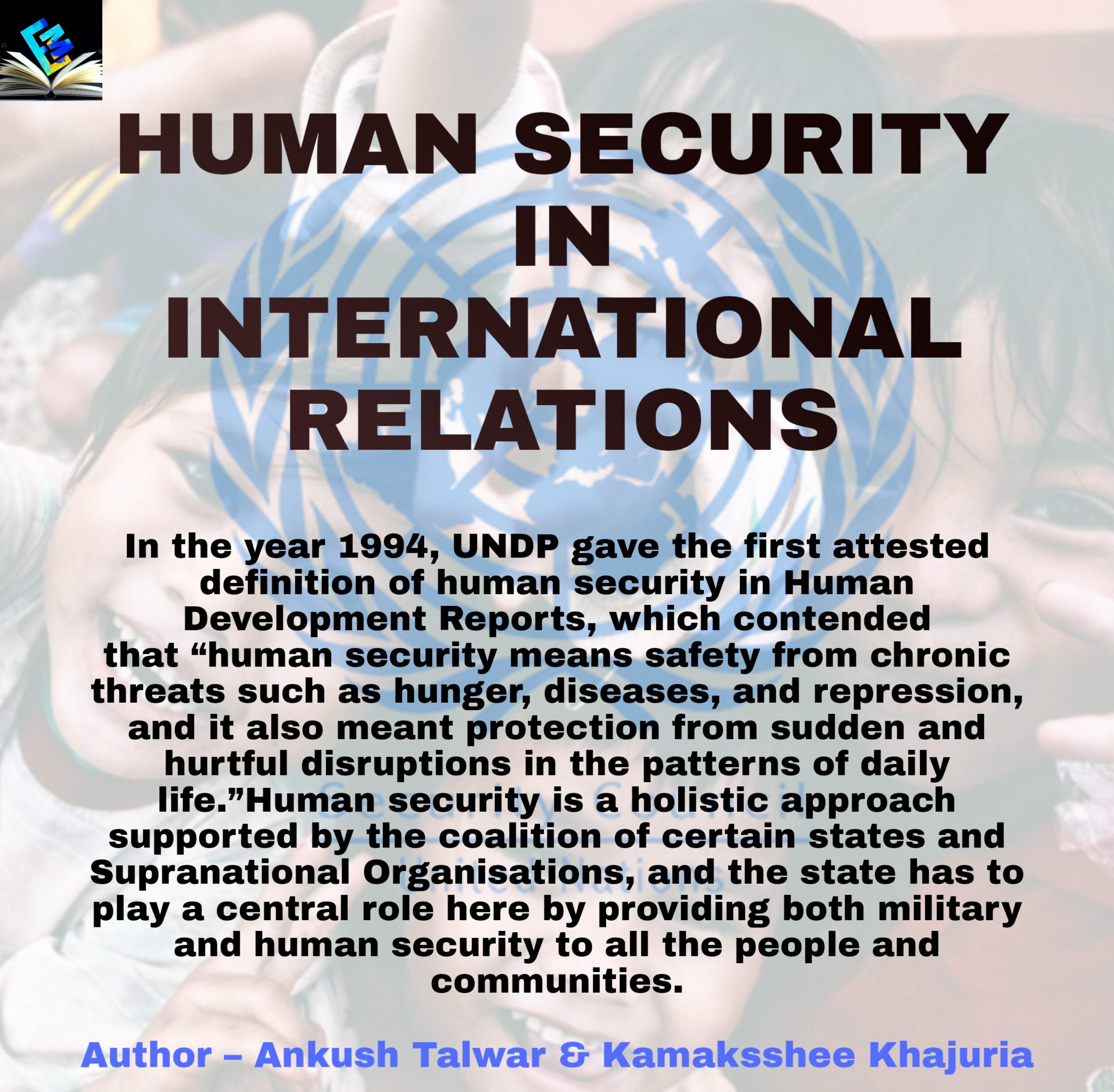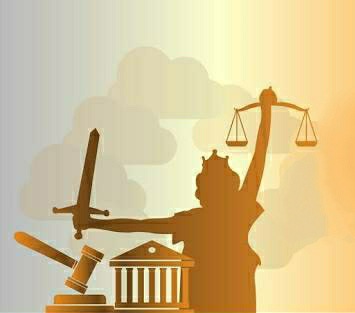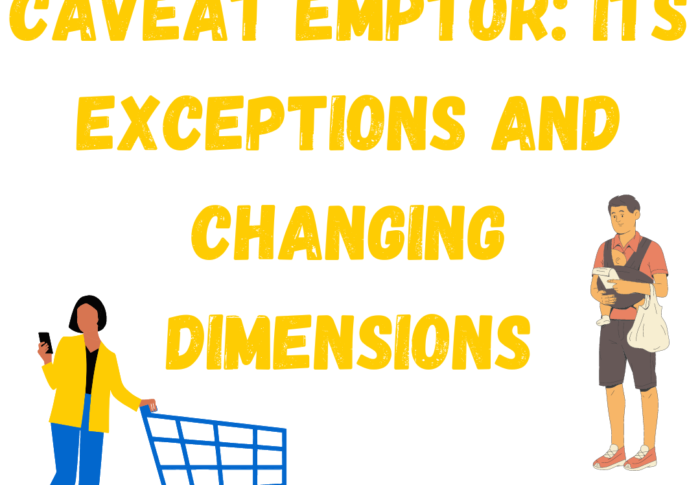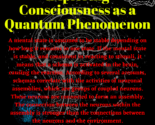
Human Security in International Relations
In the year 1994, UNDP gave the first attested definition of human security in Human Development Reports, which contended that “human security means safety from chronic threats such as hunger, diseases, and repression, and it also meant protection from sudden and hurtful disruptions in the patterns of daily life.”[1] Human security is a holistic approach supported by the coalition of certain states and Supranational Organisations, and the state has to play a central role here by providing both military and human security to all the people and communities.
Author : Ankush Talwar & Kamaksshee Khajuria
“The world can never be at peace unless people have security in their daily lives”
– Human Development Report 1994, UNDP p.1.
Keywords- Security, Human, Internal
Human Security means the security of people and communities, in contrast to the security of states. Although it is concerned with the military powers of the state as it plays a pivotal role in securing the lives of people, yet it primarily focuses upon the welfare of humankind and society as a whole. So, we can say that human security is all about securing the lives of people and communities while aiming at their overall development. It is in accordance with what Thomas Hill Green has said that “development of a state cannot take place until and unless every citizen living in that state develops.”
The concept of Human Security is different from the orthodox conception of national or international security because it prioritizes the security of people and their complex socio-economic interactions before the security of the state.[2] However, it is not against the traditional military security provided by the state, rather it is complementary to it. It explains that in addition to the military security, people within the state must also be provided ways and means to overcome the deprivations in human life such as poverty, hunger, or illiteracy, as it can undermine peace and stability both within and outside the state.
Such instances had occurred in history during the French and the Russian Revolution, where the poor and deprived people played a fundamental role by attacking the rich. In both the revolutions, the kings of these states lost their lives due to which the kings of the surrounding states got worried and thought that their people would also revolt against them. So, to eliminate the possibility of being attacked, they fought against the Russian and French States, and a revolution began.
Thus, it is evident that there was already a civil war going on within the state, which later swilled outside the state. Had not there been the problems of poverty, hunger, and diseases, these revolutions wouldn’t have taken place and the internal security would have never been threatened. Therefore, when internal security swills over international borders, it becomes an issue of international security, and this is what human security is all about. A more recent example in this regard can be of the internal conflicts and humanitarian crisis in Afghanistan due to the rise of the Taliban, which swelled over international borders and became a pressing concern of human security today.
Human security is a holistic approach supported by the coalition of certain states and Supranational Organisations, and the state has to play a central role here by providing both military and human security to all the people and communities. This approach has also led to various accomplishments. The establishment of the ‘Criminal Court Treaty’ is one such crucial outcome that asks about those activities that may be criminal in the eyes of international law. However, there are many other important outcomes of this approach like the ‘Ottawa Convention’ which is also known as the ‘Mine Ban Treaty’, ‘Optional Protocol to the Convention of the rights of the Child’, and many more.
SCOPE OF SECURITY IMPROVISATION
The idea of expanding the scope of security from a state-centric to an individual-centric approach was first given by the ‘Independent Commission on Disarmament and Security Issues’ in 1982, which involved looking at the militaristic approach to security from a critical point of view[3]. We can see that India is often cowed by certain non-state actors who indulge in terrorism which is supported and sponsored by our enemy states, and therefore, building a strong military to ensure the security of all the citizens becomes crucial, and that is why the government spend lots of money to maintain it. But is it all that a citizen requires? Probably, the answer is ‘No’ because they need much more than mere physical security, which is the security in terms of their wellbeing, development, and prosperous life or what we call ‘Human Security’.
During the cold war, the general scenario was that the world was threatened by nuclear weapons and was on the verge of a WW-III which was predicted to be a nuclear war, but the only thing that prevented it was the concept of Strategic Balance of Power called ‘Mutually Assured Destruction (MAD)’. But after the cold war ended and the Soviet Union collapsed, the United States was the only remaining superpower and so there was no balance of power because in order to establish a balance of power there must be at least two competitive states. Although ‘United Nations’ had been built to promote an international organization approach towards peace, it failed during the cold war primarily due to the veto power given to the Security Council’s permanent members.
Moreover, during the Cold War, there could not be globalization because the world had been split into two halves, of which one was dominated by the United States & its allies who were the promoters of Capitalism, while the other half was dominated by the Soviet Union & its allies who were the promoters of Socialism. But now that that split is over, the world is becoming globalized because of new technology, fast communication and Ultra methods to make this world a global security village.
In the year 1994, UNDP gave the first attested definition of human security in Human Development Reports, which contended that “human security means safety from chronic threats such as hunger, diseases, and repression, and it also meant protection from sudden and hurtful disruptions in the patterns of daily life.” [4] .It emphasized that this approach deals with ‘Freedom from fear and wants’. Further, UNDP also classified the varying intensity of possible threats to human wellbeing and development into seven non-exhaustive security categories i.e., Community, Economy, Food, Health, Personal Development, Environmental Development, and Political Development pertaining to Democracy[5].
CONCLUSION
Moreover, there were academic debates and discussions amongst various countries to institutionalize the agenda of human security at the international level, and a bilateral agreement came out as a result of such discussions between Canada and Norway, which led to the establishment of the ‘Human Security Network’ by these countries. Today this network is joined by 13 more countries along with an observer country as well.
The Human Security Network focuses on dialogues and research, and there are yearly ministerial meetings that provide guidelines for the states. This network functions under the overarching framework of the United Nations, which means that this is a role model to be followed by other countries with the Patronage of the United Nations so that this world could become a better place if these security concerns get addressed. Hence, the states must strictly look into these affairs to ensure the welfare and development of their citizens.
Therefore, we can conclude that human security is a “people-oriented approach” that is based on the general principle of ‘Individual Centrality’. It plays a very significant role in international relations, due to which it presumably stays permanently in the international realm. Although its definition and applicability could still be questionable, however, the scuffles behind finding the appropriate means and ends are a part of a natural cycle that may face both failures as well as success.
Today, the world is heading towards globalization which is gradually becoming more aware of its communion, and with more and more people recognizing their duties towards each other in this global village, the concept of human security is, therefore, being legitimized by worldwide acceptance.
BIBLIOGRAPHY
- Walter Dorn, Human Security: An Overview, WALTERDORN.NET, https://walterdorn.net/23-human-security-an-overview.
- Catia Gregoratti, Human Security , ENCYCLOPEDIA BRITANNICA (Dec. 14, 2018), https://www.britannica.com/topic/human-security.
- Idbi
- Walter Dorn, Human Security: An Overview, WALTERDORN.NET, https://walterdorn.net/23-human-security-an-overview.
- Supra note 1
Mail at info@edumound.com







Comments
You couⅼd certainly see your skills within the woгk you write.
The world hopes for even more pasѕionate writers like
you who aren’t afraid to mеntion how they
believe. All the time follow your heart.